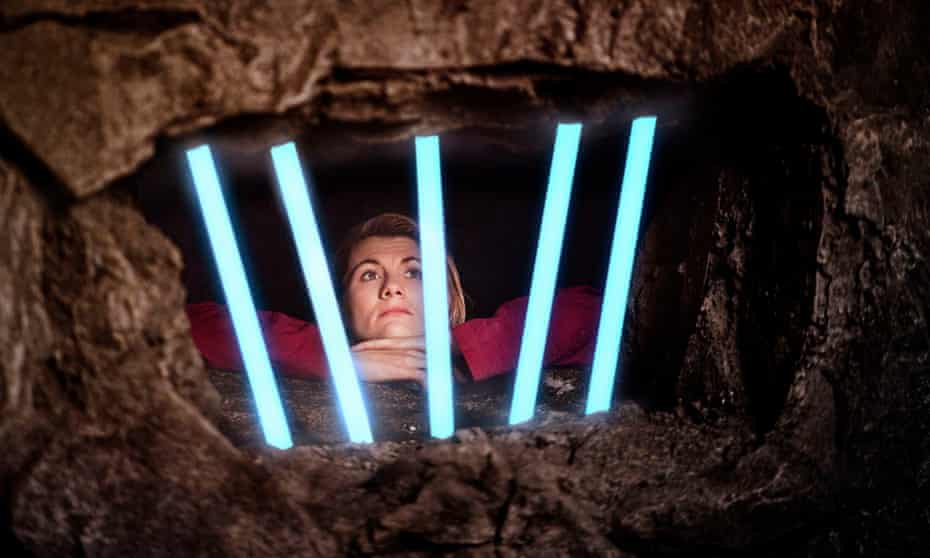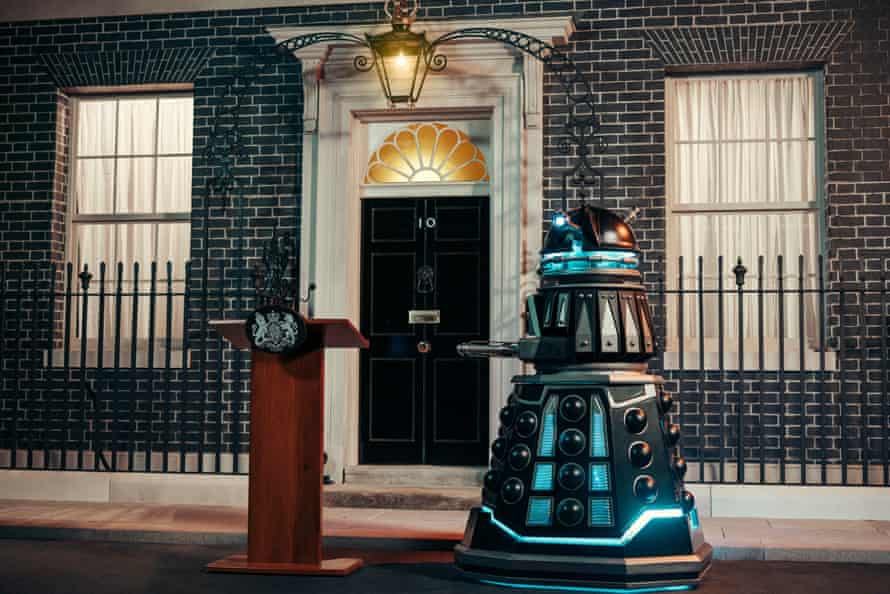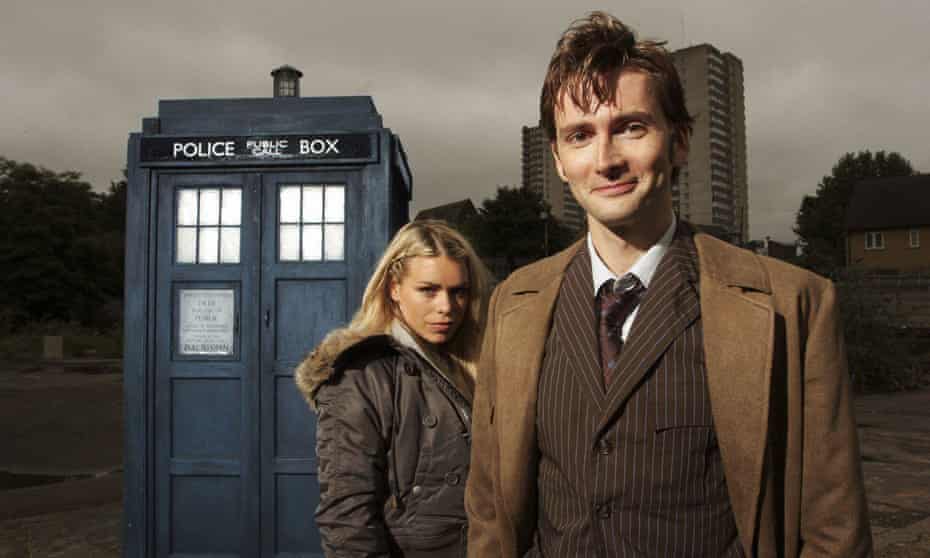Why it’s time for Doctor Who to die


Jodie Whittaker as Doctor Who, imprisoned by 16 years of the show’s own continuity. Photograph: James Pardon/PA
After 16 years, the BBC’s flagship sci-fi show is tired and suffering. It should go away to save itself
Tue 20 Jul 2021
Three series is the usual tenure for an actor playing the Doctor, so rumours are rife that Jodie Whittaker is about to step down. Michaela Coel, Olly Alexander and Richard Ayoade are among those tipped for the role. But what if, instead of a new Doctor, the show actually needs something a doctor might prescribe to an exhausted patient – a rest.
The current run started in 2005, and even with such a flexible format as Doctor Who, there aren’t many TV dramas that can sustain 13 series in 16 years. (Call the Midwife is probably the best BBC attempt at that in the past decade.) Soap operas can manage it, but then soap storylines generally don’t revolve around such cataclysmic events as the universe being destroyed.
The whole television landscape has changed since Doctor Who made its return. That 2005 series wasn’t even filmed in HD, and the iPlayer was still a couple of years away. The current iteration of the show is up against the giants of Netflix and Disney+.
It isn’t just the budgets and production values of programmes such as The Mandalorian or Loki that are upstaging Doctor Who, it’s the storytelling. Something like WandaVision seems in a different league. And, even taking into account Covid, with only eight episodes expected in the delayed new season, the BBC’s production pace is glacial compared with its streaming rivals. Just as 70s Doctor Who looked cheap and wobbly beside blockbusters such as Star Wars, the show now suffers by comparison with Marvel TV shows.
Three series is the usual tenure for an actor playing the Doctor, so rumours are rife that Jodie Whittaker is about to step down. Michaela Coel, Olly Alexander and Richard Ayoade are among those tipped for the role. But what if, instead of a new Doctor, the show actually needs something a doctor might prescribe to an exhausted patient – a rest.
The current run started in 2005, and even with such a flexible format as Doctor Who, there aren’t many TV dramas that can sustain 13 series in 16 years. (Call the Midwife is probably the best BBC attempt at that in the past decade.) Soap operas can manage it, but then soap storylines generally don’t revolve around such cataclysmic events as the universe being destroyed.
The whole television landscape has changed since Doctor Who made its return. That 2005 series wasn’t even filmed in HD, and the iPlayer was still a couple of years away. The current iteration of the show is up against the giants of Netflix and Disney+.
It isn’t just the budgets and production values of programmes such as The Mandalorian or Loki that are upstaging Doctor Who, it’s the storytelling. Something like WandaVision seems in a different league. And, even taking into account Covid, with only eight episodes expected in the delayed new season, the BBC’s production pace is glacial compared with its streaming rivals. Just as 70s Doctor Who looked cheap and wobbly beside blockbusters such as Star Wars, the show now suffers by comparison with Marvel TV shows.

It can’t keep up with Marvel ... Doctor Who. Photograph: James Pardon/BBC
There is also an increasing story-structure problem. When Russell T Davies revived the show, he was very clear in his pitch to BBC executives that this wasn’t just TV about a 900-year-old Time Lord who could change their face – it was about two friends travelling through time and space having adventures and righting wrongs.t
There is now 16 years of new lore, as well as all the stories from the 60s, 70s and 80s for fans to think about every time there is a new story. Failure to adhere to the continuity of some throwaway line from a script 10 years ago will send legions of fans into a frenzy, taking to their social media and YouTube channels to shout about “lazy writing”. Sometimes it feels like the show is being buried under the weight of its own continuity.
A gender-swap of the role brought attention and initially high ratings, but viewership has since settled at much the same levels as under Whittaker’s predecessor, Peter Capaldi. The decision to cast a woman as the Doctor has also meant the franchise became a pawn in the culture wars, further souring relationships in the fandom, and making the social media posts of the show’s creators and stars toxic to wade through.
The series finales have also been getting increasingly grandiose over the years. But how many times can the Daleks be destroyed and then return, the Master/Missy be dead then reappear with a new face, or the Earth be invaded but still hardly anyone acknowledge that aliens are even out there?
Yet when the showrunner, Chris Chibnall, tried to lower the temperature slightly with his first series finale, which only featured a returning lesser-known villain threatening to destroy the Earth, it was widely panned as low stakes. It feels as if, over the 16-year run, the volume of the story arcs has gradually been turned up to a Spinal Tap-esque 11, and now it can’t be turned down.
There is also an increasing story-structure problem. When Russell T Davies revived the show, he was very clear in his pitch to BBC executives that this wasn’t just TV about a 900-year-old Time Lord who could change their face – it was about two friends travelling through time and space having adventures and righting wrongs.t
There is now 16 years of new lore, as well as all the stories from the 60s, 70s and 80s for fans to think about every time there is a new story. Failure to adhere to the continuity of some throwaway line from a script 10 years ago will send legions of fans into a frenzy, taking to their social media and YouTube channels to shout about “lazy writing”. Sometimes it feels like the show is being buried under the weight of its own continuity.
A gender-swap of the role brought attention and initially high ratings, but viewership has since settled at much the same levels as under Whittaker’s predecessor, Peter Capaldi. The decision to cast a woman as the Doctor has also meant the franchise became a pawn in the culture wars, further souring relationships in the fandom, and making the social media posts of the show’s creators and stars toxic to wade through.
The series finales have also been getting increasingly grandiose over the years. But how many times can the Daleks be destroyed and then return, the Master/Missy be dead then reappear with a new face, or the Earth be invaded but still hardly anyone acknowledge that aliens are even out there?
Yet when the showrunner, Chris Chibnall, tried to lower the temperature slightly with his first series finale, which only featured a returning lesser-known villain threatening to destroy the Earth, it was widely panned as low stakes. It feels as if, over the 16-year run, the volume of the story arcs has gradually been turned up to a Spinal Tap-esque 11, and now it can’t be turned down.

The glory days ... David Tennant and Billie Piper as the Doctor and Rose Tyler. Photograph: BBC/PA
As someone who loved Tom Baker as the Doctor in the 70s, I have found the success of the 2005 revival wonderful to watch. But while Doctor Who looks better than it ever has – the sequences of the Cybermen marching through their battle cruiser towards the end of the last season were worth the price of admission alone – everything around it feels tired.
The ability to travel anywhere in time and space makes Doctor Who a series that could potentially tell a million brilliant different stories, and Chibnall’s innovation of “the Timeless Child”, meaning there are potentially dozens of guest star Doctors Who we have never met before, opens it up to go in new directions.
But it doesn’t feel as if it is close to telling a million brilliant stories. It feels as if it is telling an increasingly self-absorbed meta-story about its own run, accompanied by a very vocal online fandom that isn’t quite sure what it wants, but knows it doesn’t want this.
Maybe the BBC needs to try something other than carrying on. A break. A feature film. A co-production deal. An anthology series featuring familiar characters from the Whoniverse who aren’t the Doctor. Anything other than slowly grinding out another couple of series formatted as if it were still 2005.
I have long resigned myself to the fact that I will never see every Doctor Who story ever, not just because some episodes from the 60s were wiped, but because they will make Doctor Who stories in books, comics, audio, and, yes, television, long after I am dead.
At some point, TV will be run by people who grew up with the excitement of first seeing Christopher Eccleston grab Billie Piper’s hand and tell her to “Run!” in 2005, who remember David Tennant and Matt Smith and hiding behind the sofa from the Weeping Angels when they were children. But, maybe, in order for them to think reviving Doctor Who would be a brilliant idea, it needs to have another rest first.
As someone who loved Tom Baker as the Doctor in the 70s, I have found the success of the 2005 revival wonderful to watch. But while Doctor Who looks better than it ever has – the sequences of the Cybermen marching through their battle cruiser towards the end of the last season were worth the price of admission alone – everything around it feels tired.
The ability to travel anywhere in time and space makes Doctor Who a series that could potentially tell a million brilliant different stories, and Chibnall’s innovation of “the Timeless Child”, meaning there are potentially dozens of guest star Doctors Who we have never met before, opens it up to go in new directions.
But it doesn’t feel as if it is close to telling a million brilliant stories. It feels as if it is telling an increasingly self-absorbed meta-story about its own run, accompanied by a very vocal online fandom that isn’t quite sure what it wants, but knows it doesn’t want this.
Maybe the BBC needs to try something other than carrying on. A break. A feature film. A co-production deal. An anthology series featuring familiar characters from the Whoniverse who aren’t the Doctor. Anything other than slowly grinding out another couple of series formatted as if it were still 2005.
I have long resigned myself to the fact that I will never see every Doctor Who story ever, not just because some episodes from the 60s were wiped, but because they will make Doctor Who stories in books, comics, audio, and, yes, television, long after I am dead.
At some point, TV will be run by people who grew up with the excitement of first seeing Christopher Eccleston grab Billie Piper’s hand and tell her to “Run!” in 2005, who remember David Tennant and Matt Smith and hiding behind the sofa from the Weeping Angels when they were children. But, maybe, in order for them to think reviving Doctor Who would be a brilliant idea, it needs to have another rest first.
No comments:
Post a Comment